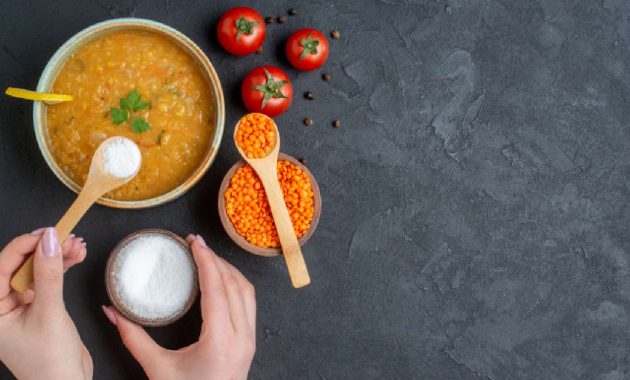Salt is essential for our health, but too much of it may lead to problems. Wondering if you are consuming a lot of salt? Here are signs you are eating too much salt.
Salt or sodium chloride is a mineral that plays a crucial role in the proper functioning of our body. But that doesn’t mean you can eat as much salt as you want! Science says that excessive consumption of salt may lead to health problems like increased blood pressure. But it is easy to have too much salt, as most of it comes from everyday foods, such as bread, and meat products. We also add it while cooking savoury dishes. Wondering how you will know if you are eating too much salt? Find out some key symptoms and signs of too much salt.
Why do we need salt?
While excess salt intake is unhealthy, salt is important for our body due to the following reasons:
- Salt helps maintain the balance of fluids in our cells, something that is critical for proper cellular function, nerve transmission, and muscle contraction, says nutritionist Abhilasha V.
- Sodium, a component of salt, plays a key role in regulating blood pressure. It helps control blood volume and fluid balance, which is vital for cardiovascular health.
- Sodium ions are essential for transmitting electrical impulses along nerves. This process is crucial for muscle movement, including the contraction of the heart.
- Salt is necessary for proper muscle function. It helps muscles contract and relax, including the muscles involved in breathing and digestion.
- Salt helps the body retain water. Adequate salt intake ensures that cells and tissues remain hydrated and function optimally.
- Chloride, another component of salt, helps maintain the body’s acid-base balance, which is essential for overall health.
- Salt plays a role in the absorption of certain nutrients, such as glucose and amino acids, in the small intestine.

What are the signs of eating too much salt?
Aa an adult, you should have salt just under a teaspoon in a day, according to the World Health Organization. Excessive salt intake can have negative effects on the body, and there are several signs that may suggest you are consuming too much salt.
1. High blood pressure
Consuming too much salt can lead to high blood pressure, which is a major risk factor for heart disease, stroke, and kidney problems. Salt retains water in the bloodstream, increasing blood volume and putting more pressure on blood vessel walls, says the expert.
2. Swelling
Excessive salt intake can cause fluid retention in the body, leading to swelling or edema, especially in the hands, feet, ankles, or abdomen. This happens because salt encourages the body to retain water to maintain fluid balance.
Also Read

3. Frequent thirst
Eating too much salt can make you feel excessively thirsty. This is because salt draws water out of cells and into the bloodstream to dilute the excess sodium, triggering the body’s thirst response.
4. Kidney issues
Excessive salt intake can strain the kidneys, which play a crucial role in filtering excess sodium from the blood. Over time, this can impair kidney function and increase the risk of kidney disease, says Abhilasha.
5. Heart palpitations or irregular heartbeat
High salt intake can disrupt the balance of electrolytes like sodium and potassium in the body. This imbalance may lead to palpitations or irregular heartbeats, especially in individuals with underlying heart conditions.
6. Frequent headaches
Consuming too much salt can contribute to dehydration and changes in blood flow. This may trigger headaches or migraines in some people.
You should reduce salt intake by watching what you eat in a restaurant, cooking with fresh ingredients, and using herbs, and spices to enhance taste instead of relying solely on salt.
Select Topics of your interest and let us customize your feed.
PERSONALISE NOW
What to do if you have eaten too much salt?
If you have consumed too much salt and are experiencing symptoms like thirst, or other discomfort, there are several steps you can take.
1. Drink plenty of water
One of the most effective ways to help flush excess sodium from your body is by increasing your water intake, says the expert. Drinking water helps dilute the concentration of sodium in your bloodstream and encourages urination, which can eliminate excess salt.

2. Eat potassium-rich foods
Potassium helps counterbalance the effects of sodium by promoting sodium excretion through urine. Consume potassium-rich foods such as bananas, oranges, spinach, potatoes, and tomatoes to help restore electrolyte balance.
3. Avoid salty foods
For the next several meals, opt for low-sodium foods to prevent further salt intake. Avoid processed or packaged foods, fast food, salty snacks, and restaurant meals that are typically high in sodium.
4. Include foods high in magnesium
Magnesium can help regulate sodium levels in the body, says the expert. Include magnesium-rich foods like nuts, leafy greens, seeds, and whole grains in your diet.
5. Drink herbal tea
Herbal teas such as dandelion tea or green tea can have diuretic properties, which means they may help increase urine output and reduce fluid retention.
6. Exercise moderately
Engage in light to moderate physical activity, such as walking and yoga. This can help stimulate circulation and encourage fluid movement in your body.
7. Use lemon or lime juice
Squeeze a fresh lemon or lime, and mix the juice with your water. This can enhance flavour and provide a natural source of potassium, says the expert.
Salt is essential for health, but excessive consumption can lead to health problems like high blood pressure and increased risk of cardiovascular diseases. So, consume salt in moderation and be mindful of dietary sources of sodium.
#signs #eating #salt
